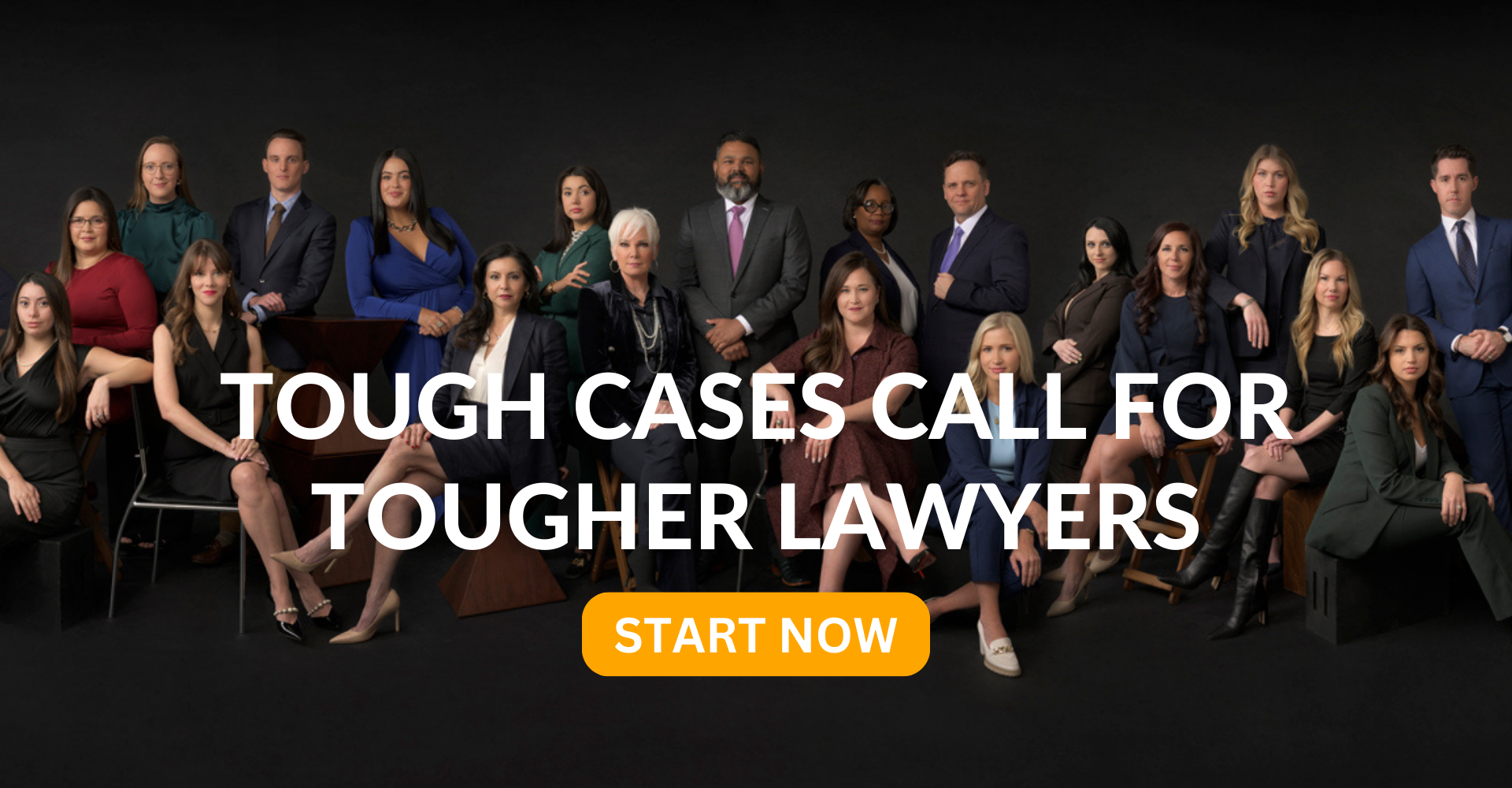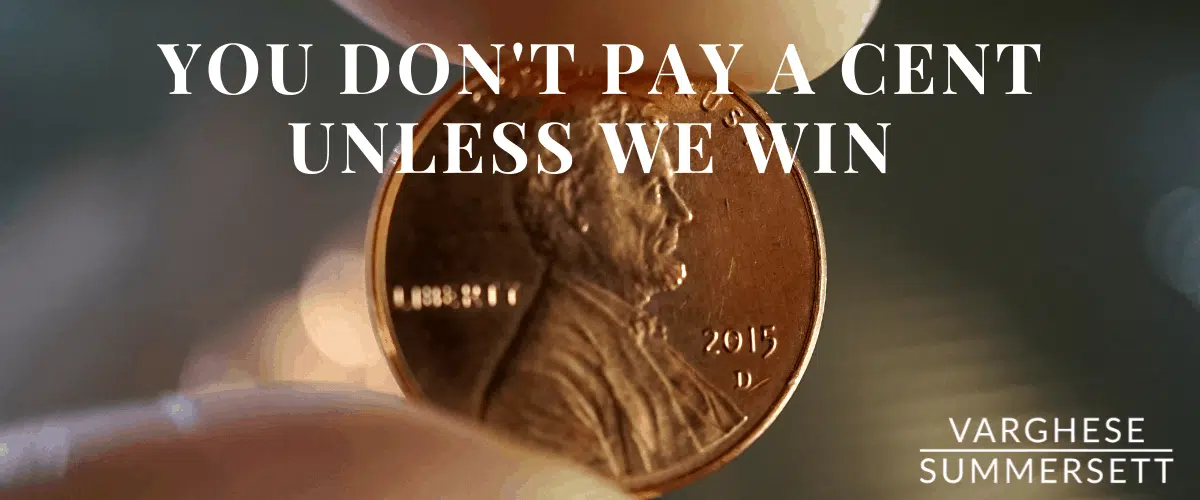Fort Worth Slip and Fall Injury Lawyer
At Varghese Summersett, we know just how devastating a slip and fall accident can be. One moment, you’re going about your day—shopping at a local store, visiting a friend’s apartment, or grabbing dinner downtown. The next moment, you’re on the ground, possibly dealing with severe pain, shock, and mounting medical bills. Slip and fall accidents are among the most common personal injury cases in Fort Worth, and they often leave victims feeling overwhelmed and unsure of what to do next.
According to the Texas Department of Insurance, there are nearly 9 million emergency room visits each year from falls. This comprehensive guide will walk you through the legal nuances of slip and fall accidents in Fort Worth. We’ll discuss your rights under Texas law, your potential compensation, and everything you need to know about hiring the right attorney. At Varghese Summersett, we have extensive experience helping individuals stand up to insurance companies and negligent property owners. If you’ve been injured due to a slip and fall, we are here to fight for the justice and compensation you deserve.

Understanding Slip and Fall Accidents in Fort Worth
Fort Worth is a bustling city with attractions such as Sundance Square, Hulen Mall, Montgomery Plaza, and Dickies Arena. These places draw thousands of visitors every day. Although most visits go smoothly, slip and fall accidents occur with alarming frequency. According to recent statistics, slip and falls comprise one of the most frequent types of personal injury cases in the region, many of which result in significant injuries.
Under Texas premises liability law, property owners and managers must maintain safe conditions for visitors. This obligation doesn’t just apply to large commercial establishments—it extends to restaurants, offices, residential buildings, and even single-family homes. When they fail to take reasonable steps to prevent hazards or warn people about them, serious accidents can happen in an instant. A puddle in a grocery aisle, a loose step at an apartment complex, or an icy walkway at an office building can lead to devastating consequences.
Beyond the physical pain, the fallout from a slip and fall accident can touch every aspect of your life. You might incur steep medical bills, need time off work, or lose the capacity to enjoy everyday activities. That’s why it’s so important to understand your rights and pursue compensation when a property owner’s negligence causes your injuries.

Common Causes of Slip and Fall Accidents
While slip and fall accidents can happen just about anywhere, certain hazards tend to pop up more frequently in Fort Worth. Knowing these causes not only helps you stay vigilant, but it also provides insight into what property owners are legally obligated to address.
- Liquid Hazards: In busy retail settings, spills can happen quickly—especially during rain events when water is tracked inside. Businesses are expected to clean up or cordon off slippery areas promptly. Malls and supermarkets often have inspection policies requiring employees to check floors within set timeframes.
- Floor Maintenance Issues: Proper floor cleaning and waxing must follow industry standards. When a property owner or manager schedules cleaning during high-traffic times without adequate signage—or fails to perform required friction tests after waxing—the risk of slips can skyrocket.
- Structural Defects: Some buildings suffer from loose or uneven flooring, broken tiles, or poorly maintained stairs and handrails. Commercial property owners must conduct regular inspections to identify and remedy these types of hazards before an accident happens.
- Weather-Related Hazards: Ice, snow, and rain can create treacherous conditions, especially in parking lots or near building entrances. Property owners have a legal responsibility to address these conditions within a reasonable timeframe (often within one hour after precipitation ends).
These are just a few examples of common issues that may cause a slip and fall. Whenever a property owner in Fort Worth fails to adequately address known hazards, the law holds them accountable.
How to Document What Happened
Proper documentation after a slip and fall accident is often the deciding factor between a successful claim and a denied one. At Varghese Summersett, we encourage our clients to gather as much information as possible—both immediately following an accident and in the weeks afterward. Here are some of the key records you need to strengthen your case:
- Medical Documentation: This includes initial emergency room records, diagnostic imaging, treatment plans, physical therapy notes, prescription records, and itemized medical billing statements with detailed codes.
- Accident Scene Documentation: Photographs of the hazard, surrounding area, lighting conditions, and lack of warnings. Surveillance footage is crucial, but it must be requested quickly—ideally within 30 days. Other important items include official incident reports, witness statements, and maintenance logs from the property owner.
- Financial Documentation: Pay stubs from before the accident, proof of lost wages, out-of-pocket expense receipts, mileage logs for trips to medical appointments, and any other relevant financial losses.
Collecting and preserving evidence may feel time-consuming, but it forms the bedrock of a successful slip and fall claim. The clearer the paper trail, the easier it is to demonstrate the property owner’s negligence and the impact of your injuries.

Getting Medical Treatment
When you’re injured in a slip and fall, your health must be your top priority. At Varghese Summersett, we’ve seen how unaddressed or poorly documented injuries can worsen over time. We urge you to follow these steps to protect your health and your legal claim:
Immediate Care (0-24 Hours): If your injuries are severe, go to a hospital as soon as possible. Notable trauma centers in Fort Worth include JPS Health Network and Texas Health Harris Methodist Hospital. Even if you think your injuries are minor, seek medical attention promptly to rule out hidden problems such as concussions or internal bleeding. Here are some local ERs and Urgent Care Centers in Fort Worth:
1. JPS Health Network Emergency Department
1500 S. Main Street, Fort Worth, TX 76104
Phone: 817-702-3431
2. Baylor Scott & White All Saints Medical Center
1400 8th Avenue, Fort Worth, TX 76104
Phone: 817-926-2544
3. Texas Health Harris Methodist Hospital Fort Worth
1301 Pennsylvania Ave, Fort Worth, TX 76104
Phone: 817-250-2000
4. Texas Health Harris Methodist Hospital Southwest
6100 Harris Parkway, Fort Worth, TX 76132
Phone: 817-433-5000
5. Medical City Fort Worth Hospital ER
900 8th Ave, Fort Worth, TX 76104
Phone: 817-336-2100
6. CityDoc Urgent Care Fort Worth
3020 W. 7th St, Suite 210, Fort Worth, TX 76107
Phone: 817-984-8687
7. University Urgent Care
3107 Greene Ave, Fort Worth, TX 76109
Phone: 817-439-9539
9. Baylor Scott & White Urgent Care – Fort Worth
950 W Magnolia Ave, Fort Worth, TX 76104
Phone number not provided
9. TotalCare Emergency Room – University
1101 University Dr, Fort Worth, TX 76107
Follow-up Care (1-7 Days): Adhere to your doctor’s orders and schedule any recommended appointments with specialists like orthopedists or neurologists. If physical therapy is advised, start as soon as possible and maintain complete records of your treatment regimen.
Long-Term Care: Some slip and fall victims require ongoing rehabilitation or repeated evaluations. Continue attending all appointments and complying with medical instructions until your doctor releases you. Keep documenting any recurring pain, difficulty in daily activities, and emotional distress. These records can play a critical role in determining damages.

Slip and Fall Insurance Claim Process
After a slip and fall in Fort Worth, the property owner’s insurance carrier typically handles the claim. You might also work with your own health insurance provider to cover immediate medical costs. Navigating these complexities can be stressful, especially while you’re recovering. Here’s what you should know about the general steps:
Initial Steps: Report the accident to the property owner or manager as soon as it happens. Obtain their insurance information but avoid giving any recorded statements or signing anything before consulting a lawyer. Contact a slip and fall attorney at Varghese Summersett for immediate guidance.
Documentation Phase: During this period, your attorney will send a letter to preserve evidence (known as a “spoliation letter”) and collect incident reports, witness statements, photos, and any available surveillance footage. Your attorney will also gather medical and employment records to show the scope of your injuries and financial losses.
Claim Processing: Your attorney will compile a demand package that includes evidence of liability, a summary of your medical treatment, the total of your economic losses, and an assessment of any non-economic damages (like pain and suffering). Negotiations with the insurance company will follow. If settlement negotiations stall, you may need to file a lawsuit within Texas’s two-year statute of limitations.

Serious Injuries That Often Result
A slip and fall might sound minor to some, but in reality, these accidents can cause life-changing injuries, including:
- Traumatic Brain Injuries and Concussions: A hard impact to the head can lead to long-term neurological complications.
- Spinal Cord Injuries and Paralysis: Damage to the spinal cord can impair mobility and require extensive medical care.
- Back and Neck Injuries: Herniated discs, sprains, and strains often cause chronic pain that can take months or years to heal.
- Broken Bones and Fractures: Wrist, hip, and ankle fractures are all too common, particularly in older adults.
- Shoulder or Hip Injuries: Torn rotator cuffs, dislocated shoulders, or broken hips can severely limit daily activities.
- Knee and Ankle Injuries: Damage to ligaments or tendons in the legs can cause instability and require surgery.
- Soft Tissue Damage: Sprains, strains, and deep bruises may lead to significant pain and mobility issues.
- Internal Injuries: Damage to organs or internal bleeding may not be immediately apparent but can be life-threatening.
Each of these injuries can involve lengthy medical care, lost wages, and extensive rehabilitation. By filing a slip and fall claim, you can seek compensation to help you recover from these setbacks and get your life back on track.

Your Legal Rights After a Fort Worth Slip and Fall Accident
Texas law sets forth the framework for holding negligent property owners accountable. Understanding your rights can make all the difference in securing fair compensation. Premises liability statutes in Texas establish certain responsibilities that property owners must uphold. Specifically, they must:
- Conduct regular inspections to identify hazards.
- Promptly repair dangerous conditions once they become aware of them.
- Provide clear and visible warnings about any known hazards.
- Maintain adequate lighting and security measures for visitors.
- Adhere to all local building codes and safety regulations.
The level of care owed to a visitor depends on that individual’s status (invitee, licensee, or trespasser). However, when someone is on the property legally—such as a customer or a social guest—property owners owe a higher duty of care. If they fail to meet this duty, they can be held liable for the injuries that result.
Keep in mind that Texas has a two-year statute of limitations for most personal injury cases, including slip and falls. If you don’t file a lawsuit before this deadline, you could lose your right to pursue compensation entirely. That’s why it’s vital to seek legal counsel promptly.

Compensation Available for Slip and Fall Victims
The damages you can pursue fall into two main categories: economic and non-economic. Understanding both types—and carefully documenting them—ensures you can claim everything you’re entitled to.
Economic Damages are the quantifiable losses you face:
- Past and future medical bills
- Lost wages if you had to miss work
- Lost earning capacity if your injuries prevent you from returning to work at the same level
- Physical therapy, rehabilitation, and in-home care costs
- Expenses for medical equipment, such as wheelchairs or ramps
- Transportation costs related to medical appointments
Non-Economic Damages compensate you for the more subjective impacts of a serious injury:
- Pain and suffering
- Emotional distress or mental anguish
- Disfigurement and disability
- Loss of enjoyment in daily activities
- Loss of consortium
Determining a fair amount of compensation usually requires a thorough analysis of medical records, employment history, and testimony from economic and medical experts. Your attorney will help compile and present these elements in a compelling fashion.

Steps to Take After a Slip and Fall Accident in Fort Worth
It’s normal to feel disoriented and uncertain after falling. By following these steps, you can protect both your health and your legal interests:
- Seek Immediate Medical Care: If you’ve been seriously hurt, call 911 or go to an emergency room right away. Even if you think your injuries are minor, prompt medical treatment can rule out hidden issues such as internal bleeding or a concussion.
- Document Everything: Take photos or videos of the scene, the hazard that caused your fall, and any lack of warning signs. Gather witness contact information and file an incident report with the property owner or manager.
- Be Careful What You Say: Avoid admitting fault or apologizing. Don’t give recorded statements to insurance companies or sign any documents without consulting an attorney first. Be cautious about discussing the accident on social media.
- Contact a Fort Worth Slip and Fall Lawyer: An experienced attorney can investigate the accident, manage the insurance process, and help ensure you receive full compensation for your injuries.
How a Fort Worth Slip and Fall Lawyer at Varghese Summersett Will Help
Hiring an attorney at Varghese Summersett immediately sets you on the right track. We shoulder the burden of paperwork and negotiation, allowing you to concentrate on healing. Here’s how we can help:
Initial Investigation: We’ll gather surveillance footage, witness statements, property inspection reports, and other key evidence. We also work with medical experts to understand the scope of your injuries.
Building Your Case: Our team identifies how and why the property owner was negligent. We document all damages—medical bills, lost wages, and pain and suffering—to present a strong claim to the insurance company or in court.
Negotiating Fair Compensation: Insurance adjusters commonly undervalue claims. We use our experience and all available evidence to negotiate a settlement that reflects the true extent of your losses. If negotiations stall, we won’t hesitate to take your case to trial.
Choosing the Right Fort Worth Slip and Fall Attorney
Not all personal injury lawyers are equally equipped to handle slip and fall cases, which can be more complex than they appear. When deciding who to hire, here’s what you should look for:
- Experience and Expertise: How long has the attorney been practicing in the field of premises liability? Do they have a history of successful settlements and trial verdicts in slip and fall cases?
- Client Focus: Communication is key in any legal case. Look for a lawyer who keeps you updated on your case’s progress and responds promptly to questions or concerns.
- Professional Recognition: Check for memberships in professional organizations, peer reviews, and awards. Peer ratings can indicate a lawyer’s reputation in the community.
At Varghese Summersett, our team is deeply familiar with the unique local rules and judges in Tarrant County. Our trial experience gives us the leverage to negotiate from a position of strength, and we’re not afraid to go to court if that’s what it takes to secure the best outcome.

Common Defenses in Slip and Fall Cases
Property owners and their insurance companies often employ a range of defense tactics to reduce or deny your claim. Familiarizing yourself with these strategies helps you and your attorney prepare an effective counterargument:
- Comparative Negligence: Texas follows a modified comparative negligence doctrine. If you’re found partially responsible for the accident, your compensation can be reduced by your percentage of fault. If you’re more than 50% responsible, you may be barred from recovering any damages.
- Open and Obvious Doctrine: Defendants sometimes claim the hazard was in plain sight and you should have reasonably avoided it.
- Lack of Notice: A common argument is that the property owner had no knowledge of the dangerous condition and therefore couldn’t have fixed or warned about it in time.
Your attorney will investigate the facts of your case and gather relevant evidence to dispute these defenses. For instance, showing that the hazard had existed for a long period—or that other people had reported it—undercuts a property owner’s “lack of notice” claim.
Tips for a Successful Slip and Fall Claim
While no lawyer can guarantee results, certain proactive steps can significantly strengthen your case:
Gather Strong Evidence: Take photos, videos, and notes about the accident, including weather conditions. Keep every bill, receipt, or record linked to the accident.
Follow Medical Advice: Never skip appointments or physical therapy sessions. Stick to your prescribed treatment plan, and keep a personal journal of your progress and setbacks.
Work Closely with Your Attorney: Share all relevant information, keep communications open, and trust the legal process. Quick settlements might seem appealing, but they rarely reflect the full cost of injuries.

Contact Our Fort Worth Slip and Fall Lawyer Today
Slip and fall accidents can derail your life in an instant, leaving you with injuries that require extensive medical care and rehabilitation. If you’ve been hurt due to someone else’s negligence, don’t shoulder the burden alone. At Varghese Summersett, we’re dedicated to helping you secure the compensation you need to move forward with your life.
Our experienced attorneys will thoroughly investigate your case, gather the evidence needed to prove negligence, and handle every step of the legal process—from negotiating with insurance adjusters to representing you in court if necessary. We understand how to present your case in a clear, compelling manner that maximizes your chances of recovering damages for your medical expenses, lost wages, pain and suffering, and more.
Time is critical. Under Texas law, you generally have two years from the date of your accident to file a lawsuit. Don’t let this window close without exploring your legal options. Contact Varghese Summersett now for a free consultation and let us guide you through the path to justice. We take pride in offering compassionate, client-focused representation, and we don’t charge any fees unless we win your case. Let our legal team stand up for you, hold negligent property owners accountable, and fight for the compensation you deserve.
Call our office today or fill out our online contact form to schedule your consultation. Let us help you pursue the financial security you need to reclaim your life after a slip and fall injury in Fort Worth.